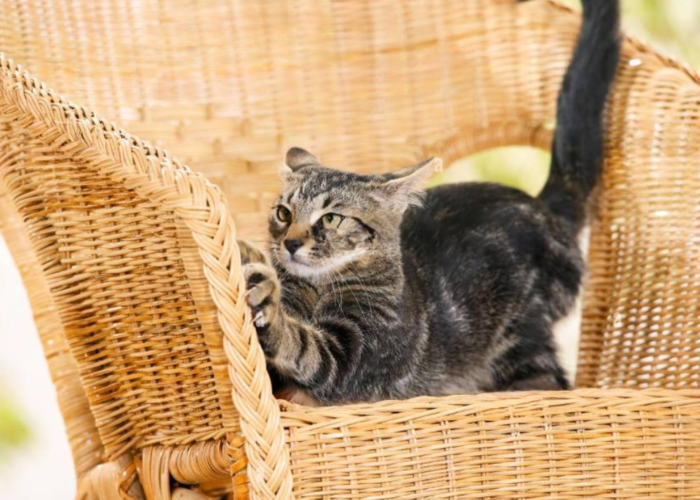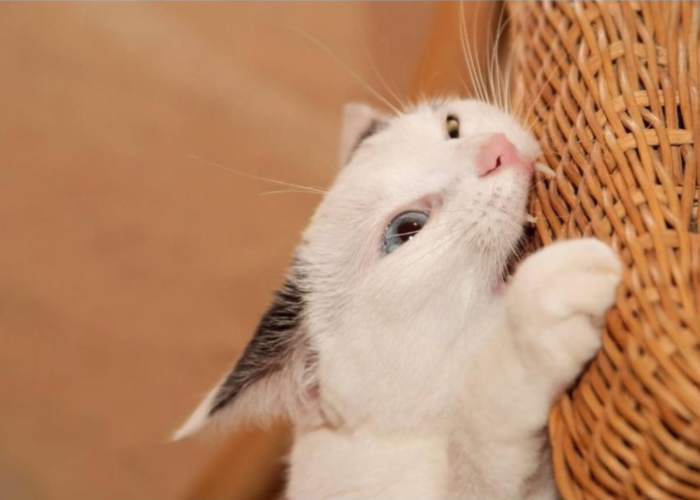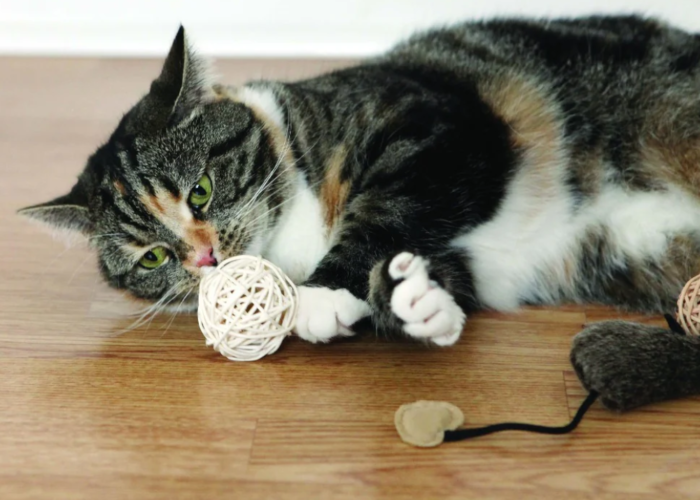If you have a cat, you may have observed it scratching on wicker items in your home. This not only damages your belongings but can also pose risks to the health of your cat. So, do cats scratch wicker furniture? How to stop them?
In this article, we will explain the reasons behind this behavior and provide strategies to address the issue.
Contents
1. Do cats scratch wicker furniture?
Cats are often scratch wicker furniture just like they can scratch any other type of furniture. Wicker furniture, with its woven texture, may provide an interesting surface for a cat to scratch due to its texture and the ability to dig their claws into it.
Cats scratch for various reasons, such as marking territory, keeping their claws clean and healthy, or relieving stress. Additionally, wicker furniture carries the natural scent of the plant, which may entice cats to mark their territory.
This is one of the challenges that many cat owners face is dealing with their cats’ scratching behavior.

2. Why cats scratch furniture and carpets?
There are various reasons why cats exhibit this behavior, and it’s not always a sign of dissatisfaction or mischief.
A common reason is that cats scratch to care for their claws. A cat’s claws are essential for self-defense, hunting, and communication. When cats scratch, they remove the outer layer of their claws, keeping them sharp. Additionally, they leave scent marks and identification cues on the scratching post, marking territory and sending messages to other cats.

Another reason is that cats scratch to relieve stress and express emotions. When cats feel anxious, fearful, or excited, they may scratch to alleviate pressure and self-soothe. This is a natural way for cats to regulate their emotions and maintain mental health.
3. How to keep cats from scratching wicker furniture?
Cats are adorable pets, but they can also be detrimental to your furniture, especially those made of wicker. To prevent cats from scratching wicker furniture, you can implement the following measures:
- Provide suitable toys for cats to satisfy their scratching needs. You can purchase scratching pads or boards covered with sisal or abrasive fabric, allowing cats to scratch comfortably without damaging your furniture.
- Train cats to differentiate between furniture and toys. You can use positive reinforcement methods, such as rewarding or petting the cat when they scratch in the right place, and employ negative reinforcement methods, such as spraying water or making noise when they scratch in the wrong place.

- Protect the furniture by covering or shielding it. You can use pieces of fabric, nylon, or aluminum foil to wrap or shield the parts of your wicker furniture that are prone to scratching. This will reduce their attraction to these areas and prevent them from accessing them.
- Use products with unpleasant odors or tastes to deter cats. You can spray scents like orange, lemon, mint, or essential oils on your wicker furniture. These smells will make cats uncomfortable and keep them away. However, you should check whether the products affect the color or material of the furniture before using them.
By applying these measures, you can help protect your wicker furniture from cat attacks and ensure that your cats lead happy and healthy lives.
4. FAQs
4.1 Do cats like wicker baskets?
Cats are highly independent animals that often prefer to rest in warm, quiet, and safe places. Wicker baskets can provide these qualities, as they are round in shape, can retain warmth, and shield cats from surrounding sounds and light.
Therefore, it can be said that cats like wicker baskets, but this also depends on individual cats and specific baskets. Some cats may not like wicker baskets because they feel confined or irritated by the wicker material. Certain wicker baskets may also be unsuitable for cats due to being too small, too large, or too rigid.
Therefore, when choosing a wicker basket for a cat, you should carefully consider factors such as size, shape, softness, and material.
4.2 What smell does a cat hate?
Some odors that cats dislike include the scent of oranges, lemons, mint, coffee, garlic, onions, vinegar, and spicy foods. The reason is that cats have a highly sensitive sense of smell, and these odors can overly stimulate the olfactory cells in their noses.
Cats may also dislike smells associated with enemies or danger, such as the scent of dogs, snakes, mice, or insect repellents. These odors can make them feel anxious, fearful, or defensive. Cats may also be averse to new or unfamiliar smells that differ from their accustomed environment.
4.3 Does trimming cat’s nails help with scratching?
Trimming a cat’s nails is a way to minimize the damage caused by their claws when they scratch objects or people. However, trimming a cat’s nails can also impact the cat’s health and behavior. Claws are an essential part of a cat’s body, aiding in grip, balance, self-defense, and territorial marking. If you cut the claws too short, it can cause pain for the cat, making them fearful or uncomfortable. It may also reduce their confidence and freedom when they can’t use their claws normally.
Therefore, before deciding to trim a cat’s nails, you should carefully consider the benefits and risks, as well as learn how to safely and effectively cut their claws.
5. Conclusion
Overall, cats may indeed scratch wicker furniture for various reasons, including maintaining their claws, marking territory, and relieving stress. To prevent this behavior, cat owners can provide suitable scratching alternatives, train their cats, protect the furniture, and use deterrents like unpleasant scents.
Additionally, it’s important to consider the preferences and individuality of each cat when choosing items like wicker baskets and to be cautious when trimming a cat’s nails to avoid causing discomfort or behavioral issues.
For further questions, don’t hesitate to send us an email us at [email protected] or message us at WhatsApp: +84967485411. Hope to serve you soon! Best regard!


